the Pythagorean Order of Death
dedicated to restoring Atlantean Democracy
Regional::Blue:Isocahedron::EM:Mars::Aries:Scorpio::Nefesh
Open to the "Argentum Astrum" or outer three degrees of co-masonry (OES)
----------------------------------------------------------------------------------------
----------------------------------------------------------------------------------------
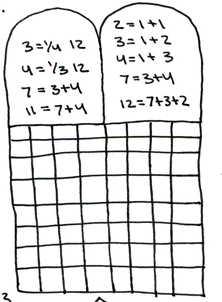 these are the reverse sides of the tablets of the ancient "law," the right understanding and meaning of which have long since been forgotten.
these are the reverse sides of the tablets of the ancient "law," the right understanding and meaning of which have long since been forgotten.
----------------------------------------------------------------------------------------
:: the "name of the "rose" ::
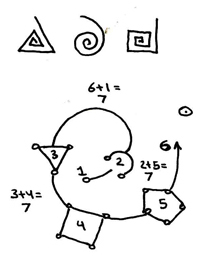

This is the "Rose" that "grew" over the "ruins."
----------------------------------------------------------------------------------------
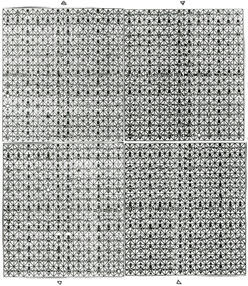 the four cardinal direction, elemental "Watch Towers" of the Enochian system.
the four cardinal direction, elemental "Watch Towers" of the Enochian system.
----------------------------------------------------------------------------------------
----------------------------------------------------------------------------------------
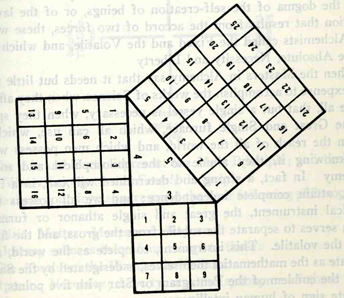 these diagrams will show you how to fold the "kamea" #-squares around a Pythagorean spiral.
these diagrams will show you how to fold the "kamea" #-squares around a Pythagorean spiral.
----------------------------------------------------------------------------------------
----------------------------------------------------------------------------------------
----------------------------------------------------------------------------------------
-
Comment by Jonathan Barlow Gee on March 29, 2012 at 10:45am
-

"This day, this day, this, this
The Royal Wedding is.
Art thou thereto by birth inclined,
And unto joy of God designed?
Then mayest thou to the mountain tend,
Whereon three stately Temples stand,
And there see all from end to end.
Keep watch, and ward,
Thy self regard;
Unless with diligence thou bathe,
The Wedding can't thee harmless save;
He will damage that here delays;
Let him beware too light that weighs."
-source: http://www.crcsite.org/wedding1.htm
-
Comment by Jonathan Barlow Gee on March 29, 2012 at 10:47am
-
Fama Fraternitatis
Quote: Seeing the only wise and merciful God in these latter days hath poured out
so richly his mercy and goodness to mankind, where by we do attain more and
more to the perfect knowledge of his Son Jesus Christ and Nature, that
justly we may boast of the happy time, wherein there is not only discovered
unto us the half part of the world, which was heretofore unknown and hidden,
but he hath also made manifest unto us many wonderful, and never heretofore
seen, works and creatures of Nature, and moreover hath raised men, imbued
with great wisdom, who might partly renew and reduce all arts (in this our
age spotted and imperfect) to perfection; so that finally man might thereby
understand his own nobleness and worth, and why he is called Microcosmus,(1)
and how far his knowledge extendeth into Nature.
Although the rude world herewith will he but little pleased, but rather
smile and scoff thereat; also the pride and covetousness of the learned is
so great, it will not suffer them to agree together; but were they united,
they might out of all those things which in this our age God doth so richly
bestow upon us, collect Librum Naturae, or a perfect method of all arts: but
such is their opposition, that they still keep, and are loth to leave the
old course, esteeming Porphyry,(2) Aristotle, and Galen, yea and that which
bath but a mere show of learning, more than the clear and manifested light
and truth; who if they were now living, with much joy would leave their
erroneous doctrines. But here is too great weakness for such a great work.
And although in theology, physics, and the mathematics, the truth doth
oppose itself(3) nevertheless the old enemy by his subtlety and craft doth
show himself in hindering every good purpose by his instruments and
contentious wavering people. To such an intent of a general reformation, the
most godly and highly illuminated father, our brother, C.R. a German, the
chief and original of our Fraternity, hath much and long time laboured, who
by reason of his poverty (although descended of noble parents) in the fifth
year of his age was placed in a cloister, where he had learned indifferently
the Greek and Latin tongues, who (upon his earnest desire and request) being
yet in his growing years, was associated to a brother, P.A.L. who had
determined to go to the Holy Land.
-
Comment by Jonathan Barlow Gee on March 29, 2012 at 10:47am
-
Although this brother died in Ciprus,(4) and so never came to Jerusalem, yet
our brother C.R. did not return, but shipped himself over, and went to
Damasco,(5) minding from thence to go to Jerusalem; but by reason of the
feebleness of his body he remained still there, and by his skill in physic
he obtained much favour with the Turks. In the meantime he became by chance
acquainted with the wise men of Damasco in Arabia, and beheld what great
wonders they wrought, and how Nature was discovered unto them; hereby was
that high and noble spirit of brother C.R. so stirred up, that Jerusalem was
not so much now in his mind as Damasco; also he could not bridle his desires
any longer, but made a bargain with the Arabians, that they should carry him
for a certain sum of money to Damasco; he was but of the age of sixteen
years when he came thither, yet of a strong Dutch constitution. There the
wise received him (as he himself witnesseth) not as a stranger, but as one
whom they had long expected; they called him by his name, and showed him
other secrets out of his cloister, whereat he could not but mightily wonder.
He learned there better the Arabian tongue, so that the year following he
translated the book M. into good Latin, which he afterwards brought with
him. This is the place where he did learn his physicks, and his
mathematicks, whereof the world hath just cause to rejoice, if there were
more love, and less envy. After three years he returned again with good
consent, shipped himself over Sinus Arabicus into Egypt, where he remained
not long, but only took better notice there of the plants and creatures. He
sailed over the whole Mediterranean sea for to come unto Fez, where the
Arabians had directed him. And it is a great shame unto us, that wise men,
so far remote the one from the other, should not only be of one opinion,
hating all contentious writings, but also be so willing and ready under the
seal of secrecy to impart their secrets to others.
Every year the Arabians and Africans do send one to another, inquiring one
of another out of their arts, if happily they had found out some better
things, or if experience had weakened their reasons. Yearly there came
something to light, whereby the mathematica, physic, and magic (for in those
are they of Fez most skilful) were amended. As there is nowadays in Germany
no want of learned men, magicians, cabalists, physicians, and philosophers,
were there but more love and kindness among them, or that the most part of
them would not keep their secrets close only to themselves. At Fez he did
get acquaintance with those which are commonly called the Elementary
Inhabitants, who revealed unto him many of their secrets. As we Germans
likewise might gather together many things, if there were the like unity,
and desire of searching out secrets amongst us.
-
Comment by Jonathan Barlow Gee on March 29, 2012 at 10:47am
-
Of these of Fez he often did confess that their Magia was not altogether
pure, and also that their Cabala was defiled with their religion; but
notwithstanding he knew how to make good use of the same, and found still
more better grounds for his faith, altogether agreeable with the harmony of
the whole world, and wonderfully impressed in all periods of times. And
thence proceedeth that fair concord, that, as in every several kernel is
contained a whole good tree or fruit, so likewise is included in the little
body of man the whole great world, whose religion, policy, health, members,
nature, language, words and works, are agreeing, sympathizing, and in equal
tune and melody with God, heaven, and earth. And that which is dis-agreeing
with them is error, falsehood, and of the Devil, who alone is the first,
middle, and last cause of strife, blindness, and darkness in the world.
Also, might one examine all and several persons upon the earth, he should
find that which is good and right, is always agreeing with itself; but all
the rest is spotted with a thousand erroneous conceits.
After two years brother C.R. departed the city of Fez, and sailed with many
costly things into Spain, hoping well [that since] he himself had so well
and so profitably spent his time in his travel, that the learned in Europe
would highly rejoice with him, and begin to rule and order all their studies
according to those sound and sure foundations. He therefore conferred with
the learned in Spain, showing unto them the errors of our arts, and how they
might be corrected, and from whence they should gather the true Indicia of
the times to come, and wherein they ought to agree with those things that
are past; also how the faults of the Church and the whole Philosophia
Moralis was to be amended. He showed them new growths, new fruits, and
beasts, which did concord with old philosophy, and prescribed them new
Axiomata, whereby all things might fully be restored. But it was to them a
laughing matter; and being a new thing unto them, they feared that their
great name should be lessened, if they should now again begin to learn and
acknowledge their many years errors, to which they were accustomed, and
wherewith with they had gained them enough. Who-so loveth unquietness, let
him be reformed.
-
Comment by Jonathan Barlow Gee on March 29, 2012 at 10:47am
-
The same song was also sung to him by other nations, the which moved him the
more because it happened to him contrary to his expectations, being ready
then bountifully to impart all his arts and secrets to the learned, if they
would have but undertaken to write the true and infallible Axiomata, out of
all faculties, sciences, and arts, and whole Nature, as that which he knew
would direct them, like a globe or circle, to the only middle point and
Centrum, and (as is usual among the Arabians) it should only serve to the
wise and learned as a rule. That also there might be a Society in Europe,
which might have gold, silver, and precious stones, sufficient for to bestow
them on kings, for their necessary uses and lawful purposes; with which such
as be governors might be brought up, for to learn all that which God hath
suffered man to know, and thereby to he enabled in all times of need to give
their counsel unto those that seek it, like the heathen oracles. Verily we
must confess that the world in those days was already big with those great
commotions, labouring to be delivered of them; and did bring forth painful,
worthy men, who broke with all force through darkness and barbarism, and
left us who succeeded to follow them: and assuredly they have been the
uppermost point in trigono igneo, whose flame now should be more and more
bright, and shall undoubtedly give to the world the last light.
Such a one likewise hath Theophrastus been in vocation and callings,
although he was none of our Fraternity, yet nevertheless hath he diligently
read over the book M: whereby his sharp ingenium was exalted; but this man
was also hindered in his course by the multitude of the learned and
wise-seeming men, that he was never able peacefully to confer with others of
his knowledge and understanding he had of Nature. And therefore in his
writing he rather mocked these busy bodies, and doth not show them
altogether what he was: yet nevertheless there is found with him well
grounded the aforenamed Harmonia, which without doubt he had imparted to the
learned, if he had not found them rather worthy of subtle vexation, than to
be instructed in greater arts and sciences; he then with a free and careless
life lost his time, and left unto the world their foolish pleasures.
-
Comment by Jonathan Barlow Gee on March 29, 2012 at 10:48am
-
But that we do not forget our loving father, brother C.R., he after many
painful travels, and his fruitless true instructions, returned again into
Germany, the which he (by reason of the alterations which were shortly to
come, and of the strange and dangerous contentions) heartily loved. There,
although he could have bragged with his art, but specially of the
transmutations of metals, yet did he esteem more Heaven, and the citizens
thereof, Man, than all vain glory and pomp.
Nevertheless he built a fitting and neat habitation, in which he ruminated
his voyage, and philosophy, and reduced them together in a true memorial. In
this house he spent a great time in the mathematicks, and made many fine
instruments, ex omnibus hajus artis partibus, whereof there is but little
remaining to us, as hereafter you shall understand. After five years came
again into his mind the wished for reformation; and in regard he doubted of
the aid and help of others, although he himself was painful, lusty, and
unwearying, he undertook, with some few joined with him, to attempt the
same. Wherefore he desired to this end, to have out of his first cloister
(to the which he bare a great affection) three of his brethren, brother
G.V., brother J.A., and brother J.O., who besides that, they had some more
knowledge in the arts, than in that time many others had, he did bind those
three unto himself, to be faithful, diligent, and secret; as also to commit
carefully to writing, all that which he should direct and instruct them in,
to the end that those which were to come, and through especial revelation
should be received into this Fraternity, might not be deceived of the least
syllable and word.
-
Comment by Jonathan Barlow Gee on March 29, 2012 at 10:48am
-
After this manner began the Fraternity of the Rose Cross; first, by four
persons only, and by them was made the magical language and writing, with a
large dictionary, which we yet daily use to God's praise and glory, and do
find great wisdom therein; they made also the first part of the book M. But
in respect that that labour was too heavy, and the unspeakable concourse of
the sick hindered them, and also whilst his new building (called Sancti
spiritus) was now finished, they concluded to draw and receive yet others
more into their Fraternity; to this end was chosen brother R.C., his
deceased father's brother's son, brother B. a skilful painter, G. and P.D.
their secretary, all Germans except J.A. so in all they were eight in
number, all bachelors and of vowed virginity; by those was collected a book
or volume of all that which man can desire, wish, or hope for.
Although we do now freely confess, that the world is much amended within an
hundred years, yet we are assured that our Axiomata shall unmovably remain
unto the world's end, and also the world in her highest and last age shall
not attain to see anything else; for our Rota takes her beginning from that
day when God spake Fiat, and shall end when he shall speak Pereat; yet God's
clock striketh every minute, where ours scarce striketh perfect hours. We
also steadfastly believe, that if our brethren and fathers had lived in this
our present and clear light, they would more roughly have handled the Pope,
Mahomet, scribes, artists, and sophisters, and had showed themselves more
helpful, not simply with sighs, and wishing of their end and consummation.
-
Comment by Jonathan Barlow Gee on March 29, 2012 at 10:48am
-
When now these eight brethren had disposed and ordered all things in such
manner, as there was not now need of any great labour, and also that
everyone was sufficiently instructed, and able perfectly to discourse of
secret and manifest philosophy, they would not remain any longer together,
but as in the beginning they had agreed, they separated themselves into
several countries, because that not only their Axiomata might in secret be
more profoundly examined by the learned, but that they themselves, if in
some country or other they observed anything, or perceived some error, they
might inform one another of it.
Their agreement was this: First, That none of them should profess any other
thing than to cure the sick, and that gratis. 2. None of the posterity
should be constrained to wear one certain kind of habit, but therein to
follow the custom of the country. 3. That every year upon the day C. they
should meet together in the house S. Spiritus, or write the cause of his
absence. 4. Every brother should look about for a worthy person, who, after
his decease, might succeed him. 5. The word C.R. should be their seal, mark,
and character. 6. The Fraternity should remain secret one hundred years.
These six articles they bound themselves one to another to keep, and five of
the brethren departed, only the brethren B. and D. remained with the father,
Fra. R. C., a whole year; when these likewise departed. Then remained by him
his cousin and brother J.O. so that he hath all the days of his life with
him two of his brethren. And although that as yet the Church was not
cleansed, nevertheless we know that they did think of her, and what with
longing desire they looked for. Every year they assembled together with joy,
and made a full resolution of that which they had done; there must certainly
have been great pleasure, to hear truly and without invention related and
rehearsed all the wonders which God had poured out here and there through
the world. Everyone may hold it out for certain, that such persons as were
sent, and joined together by God, and the heavens, and chosen out of the
wisest of men, as have lived in many ages, did live together above all
others in highest unity, greatest secrecy, and most kindness one towards
another.
-
Comment by Jonathan Barlow Gee on March 29, 2012 at 10:48am
-
After such a most laudable sort they did spend their lives, and although
they were free from all diseases and pain, yet notwithstanding they could
not live and pass their time appointed of God. The first of this Fraternity
which died, and that in England, was J.O., as brother C. long before had
foretold him; he was very expert, and well learned in Cabala, as his book
called H. witnesseth. In England he is much spoken of; and chiefly because
he cured a young Earl of Norfolk of the leprosy. They had concluded, that as
much as possibly could be, their burial place should be kept secret, as at
this day it is not known unto us what is become of some of them, yet
everyone's place was supplied with a fit successor. But this we will confess
publicly by these presents to the honour of God, that what secrets soever we
have learned out of the book M. (although before our eyes we behold the
image and pattern of all the world) yet are there not shown unto us our
misfortunes, nor hour of death, the which only is known to God himself, who
thereby would have us keep in a continual readiness. But hereof more in our
Confession, where we do set down 37 reasons wherefore we now do make known
our Fraternity, and proffer such high mysteries, and without constraint and
reward. Also we do promise more gold than both the Indies bring to the King
of Spain; for Europe is with child and will bring forth a strong child, who
shall stand in need of a great godfather's gift.
After the death of J.O., brother R.C. rested not, but as soon as he could,
called the rest together (and as we suppose) then his grave was made.
Although hitherto we (who were the latest) did not know when our loving
father R.C. died, and had no more but the bare names of the beginners, and
all their successors, to us, yet there came into our memory a secret, which
through dark and hidden words, and speeches of the 100 years, brother A.,
the successor of D. (who was of the last and second row and succession, and
had lived amongst many of us) did impart unto us of the third row and
succession. Otherwise we must confess, that after the death of the said A.
none of us had in any manner known anything of brother R.C. and of his first
fellow-brethren, than that which was extant of them in our philosophical
Bibliotheca, amongst which our Axiomata was held for the chiefest, Rota
Mundi for the most artificial, and Protheus the most profitable. Likewise we
do not certainly know if these of the second row have been of the like
wisdom as the first, and if they were admitted to all things. It shall be
declared hereafter to the gentle Reader, not only what we have heard of the
burial of R.C., but also made manifest publicly by the foresight,
sufferance, and commandment of God, whom we most faithfully obey, that if we
shall be answered discreetly and Christian-like, we will not be afraid to
set forth publicly in print our names and surnames, our meetings, or
anything else that may be required at our hands.
-
Comment by Jonathan Barlow Gee on March 29, 2012 at 10:49am
-
Now the true and fundamental relation of the finding out of the high
illuminated man of God, Fra. C.R.C. is this. After that A. in Gallia
Narbonensis was deceased, then succeeded in his place our loving brother
N.N. This man after he had repaired unto us to take the solemn oath of
fidelity and secrecy, he informed us bona fide, that A. had comforted him in
telling him that this Fraternity should ere long not remain so hidden, but
should be to all the whole German nation helpful, needful, and commendable;
of the which he was not in any wise in his estate ashamed of. The year
following, after he had performed his school right and was minded now to
travel, being for that purpose sufficiently provided with Fortunatus' purse,
he thought (he being a good architect) to alter something of his building
and to make it more fit. In such renewing he lighted upon the memorial table
which was cast of brass, and containeth all the names of the brethren, with
some few other things. This he would transfer in another more fitting vault;
for where or when Fra R.C. died, or in what country he was buried, was by
our predecessors concealed and unknown to us. In this table stuck a great
nail somewhat strong, so that when he was with force drawn out, he took with
him an indifferently big stone out of the thin wall, or plastering, of the
hidden door, and so, unlooked for, uncovered the door. wherefore we did with
by and longing throw down the rest of the wall, and cleared the door) upon
which was written in great letters, Post 120 annos patebo,(6) with the year
of the Lord under it. Therefore we gave God thanks and let it rest that same
night, because we would first overlook our Rotam. But we refer ourselves
again to the Confession, for what we here publish is done for the help of
those that are worthy, but to the unworthy (God willing) it will he small
profit. For like as our door was after so many years wonderfully discovered,
also there shall be opened a door to Europe (when the wall is removed) which
already doth begin to appear, and with great desire is expected of many.
In the morning following we opened the door, and there appeared to our sight
a vault of seven sides and corners, every side five foot broad, and the
height of eight foot. Although the sun never shined in this vault,
nevertheless it was enlightened with another sun, which had learned this
from the sun, and was situated in the upper part in the center of the
ceiling. In the midst, instead of a tombstone, was a round altar covered
over with a plate of brass, and thereon this engraven:
A.C.R.C. Hoc universi compendium unius mihi sepulchrum feci (7)
Round about the first circle, or brim, stood, Jesus mihi omnia (8)
In the middle were four figures, inclosed in circles, whose circumscription
was,
1. Nequaquam vacuum.(9)
2. Legis Jugum.(10)
3. Libertas Evangelii.(11)
4. Dei gloria intacta.(12)
Comment
- ‹ Previous
- 1
- 2
- 3
- 4
- Next ›
© 2025 Created by Jonathan Barlow Gee.
Powered by
![]()
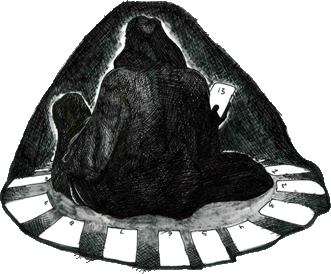
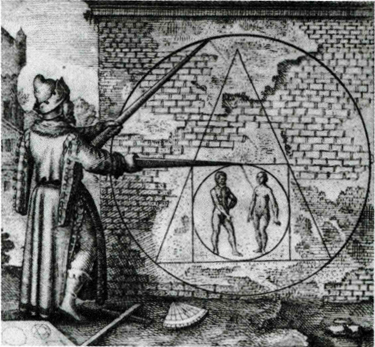
You need to be a member of the Pythagorean Order of Death to add comments!
Join the Pythagorean Order of Death